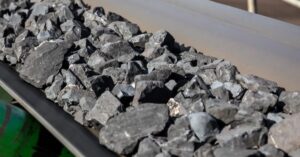
Ukraine in January-March this year, Ukraine reduced the import of nickel ores and concentrates in physical terms by 97.4% compared to the same period last year – up to 7,238 thousand tons.
According to statistics released by the State Customs Service (SCS), in monetary terms, imports of nickel ores decreased by 98% to $257,000 during the period.
Imports were from Guatemala (100% of shipments in monetary terms).
In 1Q2023, like in 1Q2022, Ukraine did not export or re-export this commodity.
As Ukrainian News earlier reported, in 2022, Ukraine reduced the imports of nickel ores and concentrates by 71.9% YoY to 346,719 tons. In monetary terms, imports of nickel ores decreased by 73.8% to $15.428 million. Imports were from Guatemala (100% of deliveries in monetary terms).
For 2022, like in 2021, Ukraine did not export or re-export this product.
Ukraine imports nickel ore from Pobuzhsky Ferronickel Plant (PFK, part of Solway Group).
PFC processes about 1.2 million tons of ore per year.
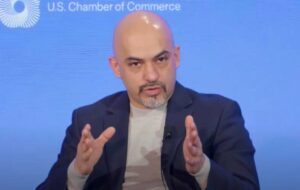
The head of the State Agency for Infrastructure Rehabilitation and Development Mustafa Nayem suggested creating a Project Implementation Unit consisting of specialists certified by international institutions who would be able to implement a unified procedure for Advanced Procurement and other stages of project implementation.
“Today it takes from 5 months to a year from the moment of allocation of funds until all procedures are passed and the contract for execution of works is signed. There are tens of thousands of such projects ahead of us. With the current procedures of international financial institutions, the reconstruction will take a century,” he said at the Ukrainian-American Partnership Forum organized by the American Chambers of Commerce of the two countries this week in Washington.
Nayem stressed that Ukraine is fundamentally different from other countries that were rebuilt by a coalition of partners after the war, such as Syria, Afghanistan or Iraq, because in Ukraine all authorities at the central and local levels continue to work.
“But it also has its “minuses”: reconstruction in Ukraine will not be from scratch, it is not greenfield construction. Internal approvals, procedures, regulation, etc. – is a big part of the processes that will affect the speed and efficiency of recovery,” said the head of the State Recovery Agency.
In his opinion, the main challenge will be not so much the lack of funds for reconstruction, but the inability to use existing resources. Nayem specified that now we have already received applications for 11-12 thousand objects.
At the same time, he stressed that Ukraine clearly understands the need to account for each spent international institutions and taxpayers of partner countries. In this connection the head of the State Restoration Agency informed about the plans to launch the compliance function in the regional services of the agency and start the certification according to the standard ISO 37001 (anti-bribery management systems) in April already.
“Already this summer, together with the team of the Ministry (of Reconstruction), we present a unified digital ecosystem for reconstruction management DREAM (Digital Reconstruction Ecosystem for Accountable Management), which will allow full access to the data of all reconstruction projects,” Nayem said.
At the same time, he called on international reconstruction partners to clearly and clearly define the criteria and mechanisms of transparency in the implementation of reconstruction projects.
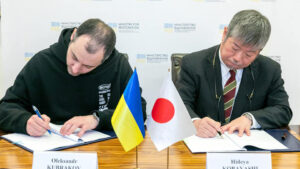
Deputy Prime Minister for Reconstruction of Ukraine – Minister of Development of Communities, Territories and Infrastructure Alexander Kubrakov and Senior Deputy Director General of Japan International Cooperation Agency JICA (JICA) Hideya Kobayashi signed an agreement on grant allocation from the Japanese government.
According to the press service of the Ministry of Reconstruction, it is about allocation of grant of 400 million dollars to Ukraine, the agreement on which was agreed in the end of March 2023. The money will be allocated as part of the Emergency Recovery Program aimed at critical infrastructure.
“This is the second grant agreement signed with the international cooperation agency JICA. This support allows us to quickly and efficiently implement projects of rapid and humanitarian recovery. First of all, we are talking about providing for the basic needs of our citizens and the restoration of critical infrastructure,” Kubrakov noted.
As noted in the press release, funds will be allocated to improve and support the following areas: equipment for humanitarian demining; transport services; energy services; management of waste of destruction; water supply; medical equipment; equipment for educational services; agricultural sector; public broadcasting sector; municipal services sector at the local government level.
“In addition, the government of Japan will provide $70 million in grant support for the reconstruction of Ukraine through the mechanism of the United Nations Development Program. In total, since the beginning of the year an agreement has been reached between Ukraine and Japan on the allocation of more than 600 million dollars for the reconstruction of Ukraine,” – noted in the Ministry of Reconstruction.
The Japan International Cooperation Agency (JICA) is a governmental organization for technical, grant (gratuitous) assistance and preferential loans to foreign governments. “JICA is one of the largest agencies in the world, providing assistance to more than 150 countries and being Japan’s “only window” through which all kinds of development assistance are provided.

The list of 254 companies hit by Ukraine’s new 10-year sanctions includes overwhelmingly Russian IT companies.
Ukrainian President Volodymyr Zelensky signed the corresponding decree No. 227/2023 on the implementation of the April 15 decision of the National Security and Defense Council.
Among the sub-sanctioned companies are, in particular, the leading Russian Internet holdings Yandex and Rambler Group, large in the market of automation services companies Parus Software Products and 1C-Galactics, as well as the well-known JSC Sitronics.
In addition, the list includes the Ukrainian LLC Corporate Business Systems (KBS) from Odessa and the Russian and Kazakh companies of the same name from Moscow and Almaty respectively.
According to opendatabot, the current beneficiaries of the Ukrainian KBS director Leonid Pashin, and the company’s revenue in 2022 was 67.4 million hryvnia. In addition, the company won tenders of the National Bank of Ukraine, Oshchadbank, the Ukrainian State Center for Radio Frequency, State Enterprise Energorynok and Odessa Commercial Sea Port.
The website of the Russian company (CBS) states that it was founded in 1998 and is a broad-based developer and systems integrator, provides services in Kazakhstan, Russia and the Central Asian countries.
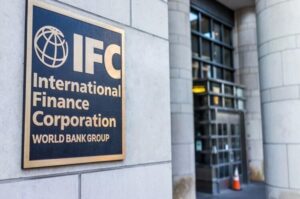
A $2 billion IFC program designed to ramp up support for Ukraine’s private sector and boost economic resilience amid Russia’s invasion of Ukraine is receiving new financial support from the Netherlands and Switzerland, IFC has said.
“The Netherlands will be providing $43 million to support Ukraine’s agricultural sector and ensure emergency liquidity for private companies in critical agri-related industries. Switzerland will provide $11 million to support Ukraine’s small-scale farmers,” IFC said in the press release.
IFC said that Ukraine’s private sector generated up to 70% of gross domestic product before Russia’s invasion and provided crucial jobs, goods, and services. In spite of one in five micro and smaller business closing (as of mid-April 2022), the sector continues maintaining strategic exports and providing taxes.
The private sector will also have a crucial role to play in the country’s reconstruction efforts, estimated at $411 billion as of February 2023 – far more than government and donors can muster alone, the corporation said.
“A strong private sector is essential to help Ukraine’s economy recover and support reconstruction efforts. We welcome the contributions made by the Netherlands and Switzerland and their strong support for Ukraine. Ukraine’s economy remains on life support, and we will continue working with other development partners to provide the guarantees and grants the private sector needs,” IFC’s Managing Director Makhtar Diop said in the press release.
IFC recalled that IFC’s $2 billion Economic Resilience Action (ERA) response package includes finance from IFC’s own account working alongside guarantees and concessional finance (or grants) from donor governments. It complements efforts IFC has made with its own capital to support the private sector in Ukraine without donor support. As of April 2023, IFC’s outstanding portfolio was nearly $300 million to private companies and financial institutions in Ukraine.
IFC expects to be able to leverage these donor funds from the Netherlands and Switzerland between 3-4 times, meaning these contributions can potentially support over $200 million of financing.
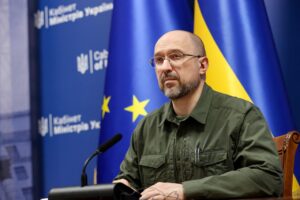
Prime Minister of Ukraine Denys Shmyhal, following the results of the Spring Meetings in Washington (the United States), announced that Ukraine would receive additional support of more than $5 billion from France, Germany, and the UK.
“Following the results of negotiations with the finance ministers of the G7 countries at the Spring Meetings, we received assurances of additional support of more than $5 billion for Ukraine. In particular, we agreed on additional support packages with France, Germany, and the UK,” Shmyhal told reporters at a briefing in Washington.
According to him, Switzerland will also provide Ukraine with CHF 1.8 billion over the next six years. And Denmark, in turn, creates a special fund and plans to fill it with EUR 1 billion.
In addition, Spain, Ireland, Japan, Lithuania, Latvia, Iceland, and the Netherlands will provide additional support to Ukraine.
“All this will help win and ensure the resilience of our economy,” the Ukrainian prime minister said.
As reported, Shmyhal met with the finance ministers of the UK, Germany, and France on the sidelines of the Spring Meetings in Washington. At the meeting, the head of government raised issues of financial support for Ukraine and interaction within the Multi-agency Donor Coordination Platform.
Germany will provide more than EUR 3 billion in additional funding this year and more than EUR 5 billion in long-term defense support.
France also plans to provide EUR 2 billion as part of long-term financing.